Psychopharmacology Final Exam
Added on 2023-05-29
26 Pages3693 Words417 Views
FINAL EXAM
PSY 87700:
Psychopharmacology
Highlight in bold the correct answer to each question. Save and upload the
entire exam.
1) Which of the following medical conditions is not typically
associated with depression?
a. AIDS
b. Diabetes
c. Gout
d. Cushing's Disease
2) A symptom which is found in clinical depression but not in
grief is:
a. Intense sadness
b. Sleep disturbance
c. Crying
d. Loss of self-esteem
3) Uncomplicated bereavement is best reduced by
a. Antidepressant medication
b. Psychoanalytic psychotherapy
c. Mourning and the passage of time
d. Antianxiety medication
PSY 87700:
Psychopharmacology
Highlight in bold the correct answer to each question. Save and upload the
entire exam.
1) Which of the following medical conditions is not typically
associated with depression?
a. AIDS
b. Diabetes
c. Gout
d. Cushing's Disease
2) A symptom which is found in clinical depression but not in
grief is:
a. Intense sadness
b. Sleep disturbance
c. Crying
d. Loss of self-esteem
3) Uncomplicated bereavement is best reduced by
a. Antidepressant medication
b. Psychoanalytic psychotherapy
c. Mourning and the passage of time
d. Antianxiety medication
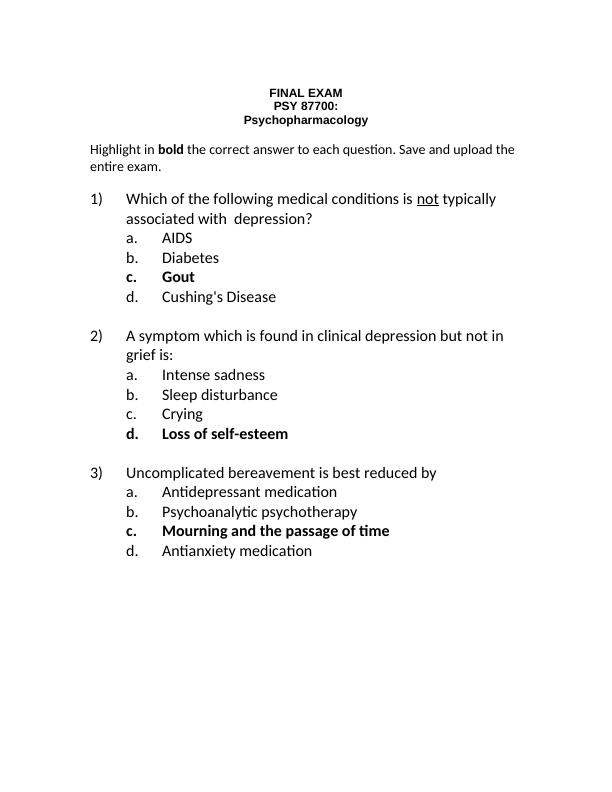
4) Some symptoms are common to all depressions, whereas
others indicate a biochemical dysfunction which may be
responsive to antidepressants. Which one of the following
symptoms is not uniquely associated with biochemical
depression?
a. Appetite Disturbance
b. Sleep disturbance
c. Reduced Libido
d. Suicidal Ideas
5) A patient on an antidepressant complains of dry mouth,
blurred vision, constipation, and trouble urinating. These
symptoms are most likely:
a. Symptoms of depression
b. Anticholinergic side effects
c. Hypochondriacal complaints
d. Due to inactivity
6) When under treatment with an MAO inhibitor, one should
avoid:
a. Red meat
b. Pea Soup
c. Aged cheese
d. Jello
others indicate a biochemical dysfunction which may be
responsive to antidepressants. Which one of the following
symptoms is not uniquely associated with biochemical
depression?
a. Appetite Disturbance
b. Sleep disturbance
c. Reduced Libido
d. Suicidal Ideas
5) A patient on an antidepressant complains of dry mouth,
blurred vision, constipation, and trouble urinating. These
symptoms are most likely:
a. Symptoms of depression
b. Anticholinergic side effects
c. Hypochondriacal complaints
d. Due to inactivity
6) When under treatment with an MAO inhibitor, one should
avoid:
a. Red meat
b. Pea Soup
c. Aged cheese
d. Jello
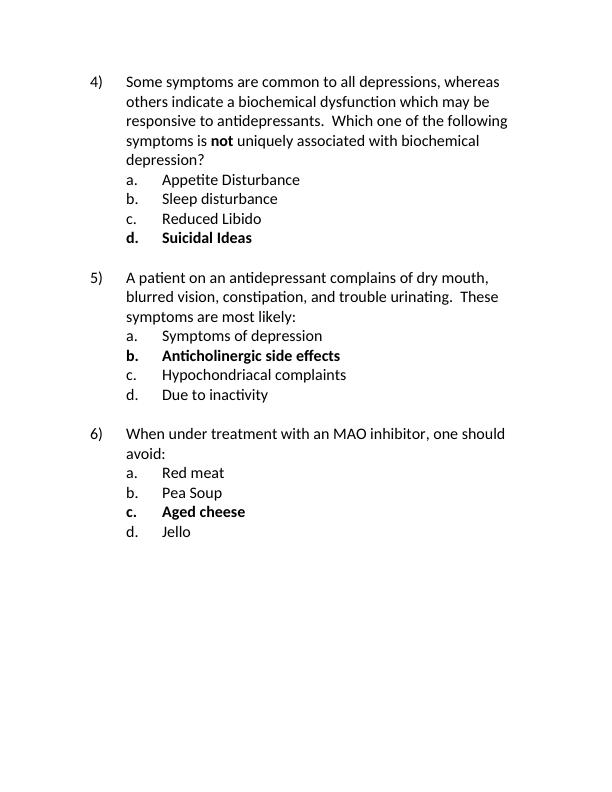
7) A patient is taking Prozac for depression and is not
responding. His physician asks you if you think
augmentation with Parnate would be a good idea. You
should tell the physician:
a. This is a sensible treatment approach
b. No -- this combination could be fatal
c. The combination is harmless, but probably won't
reduce depression
d. Combining these two medications will probably
increase depression
8) A depressed patient has a history of sexual dysfunction, and
fears that anti-depressants will make his problem worse.
You would prescribe:
a. buproprion
b. desipramine
c. imipramine
d. doxepin
9) Which one of the following is not likely to be a cause of
depression?
a. Antihypertensives
b. Antibiotics
c. Antiparkinson drugs
d. Birth control pills
10) A depressed patient has been taking adequate doses of an
SSRI for ten days and complains to you that she has felt no
improvement. You would advise this patient:
responding. His physician asks you if you think
augmentation with Parnate would be a good idea. You
should tell the physician:
a. This is a sensible treatment approach
b. No -- this combination could be fatal
c. The combination is harmless, but probably won't
reduce depression
d. Combining these two medications will probably
increase depression
8) A depressed patient has a history of sexual dysfunction, and
fears that anti-depressants will make his problem worse.
You would prescribe:
a. buproprion
b. desipramine
c. imipramine
d. doxepin
9) Which one of the following is not likely to be a cause of
depression?
a. Antihypertensives
b. Antibiotics
c. Antiparkinson drugs
d. Birth control pills
10) A depressed patient has been taking adequate doses of an
SSRI for ten days and complains to you that she has felt no
improvement. You would advise this patient:
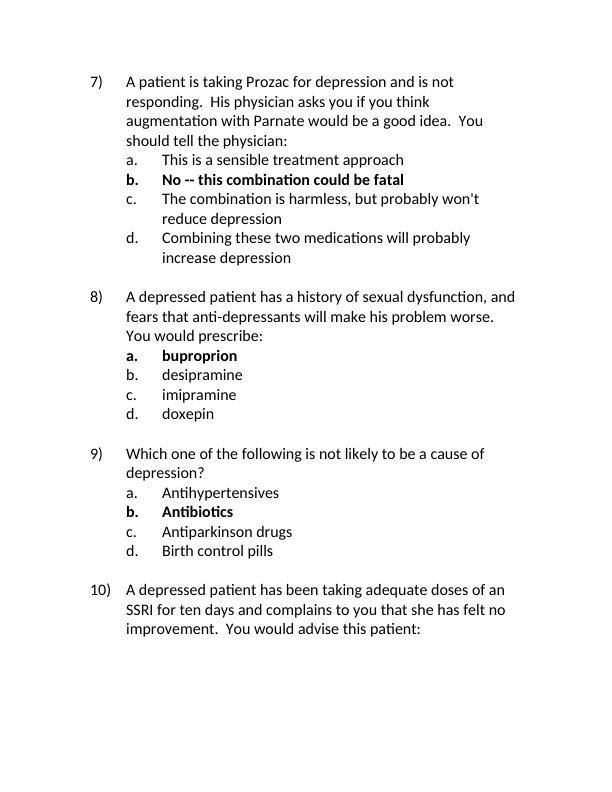
a. That she needs to stay on the medication longer
before she feels Improvement
b. To ask her physician to try a new medication
c. To discontinue her medication
d. To take St. John's Wort along with her medication
11) Medications which should be initially considered for
Generalized Anxiety Disorder include:
a. benzodiazepines and SSRIs
b. buspirone and lithium
c. buspirone, Effexor, and SSRIs
d. Valium, Librium, and Xanax
12) Classes of medications typically used for treating anxiety
disorders include:
a. SSRIs
b. Benzodiazepines
c. MAO inhibitors
d. All of the above
13) Stress induced insomnia is typically treated with short-term:
a. SSRIs
b. Benzodiazepines
c. MAO inhibitors
d. Neuroleptics
14) Beta blockers control which anxiety-related symptoms?
a. Sense of dread
b. Anxiety-evoking cognitions
c. Rapid heartbeat
d. Concentration difficulties
15) The two phases of treating panic disorder are:
before she feels Improvement
b. To ask her physician to try a new medication
c. To discontinue her medication
d. To take St. John's Wort along with her medication
11) Medications which should be initially considered for
Generalized Anxiety Disorder include:
a. benzodiazepines and SSRIs
b. buspirone and lithium
c. buspirone, Effexor, and SSRIs
d. Valium, Librium, and Xanax
12) Classes of medications typically used for treating anxiety
disorders include:
a. SSRIs
b. Benzodiazepines
c. MAO inhibitors
d. All of the above
13) Stress induced insomnia is typically treated with short-term:
a. SSRIs
b. Benzodiazepines
c. MAO inhibitors
d. Neuroleptics
14) Beta blockers control which anxiety-related symptoms?
a. Sense of dread
b. Anxiety-evoking cognitions
c. Rapid heartbeat
d. Concentration difficulties
15) The two phases of treating panic disorder are:
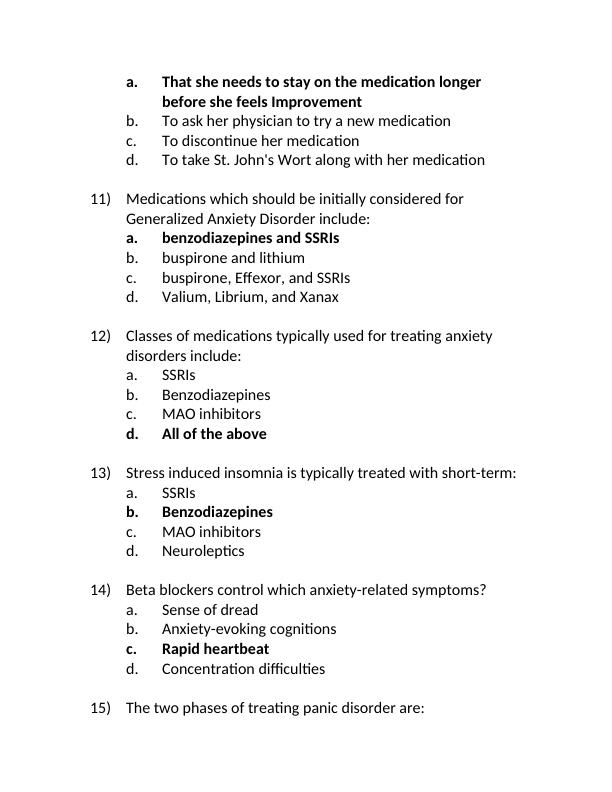
a. Reducing panic intensity with medication or
relaxation; exposure to feared situations
b. Benzodiazepine treatment; SSRI treatment
c. Immobilization; Reactivation
d. Antidepressant medication; antianxiety medication
16) Medication used for social phobia is usually:
a. MAOIs or beta blockers
b. Benzodiazepines
c. Haldol
d. Amphetamines in low doses
17) Which of the following is probably not a biochemical cause
of anxiety?
a. High levels of caffeine consumption
b. Heavy use of aspirin
c. Alcohol withdrawal
d. Steroid use
18) A patient has a history of frequently engaging in risky and
self-defeating behaviors which produce anxiety. The
treatment of choice would be:
a. Long-term benzodiazepines
b. Xanax
c. Psychotherapy
d. PRN benzodiazepines
19) Serotonin levels are increased by:
a. SSRIs
b. Benzodiazepines
c. Antipsychotic drugs
d. Desipramine
relaxation; exposure to feared situations
b. Benzodiazepine treatment; SSRI treatment
c. Immobilization; Reactivation
d. Antidepressant medication; antianxiety medication
16) Medication used for social phobia is usually:
a. MAOIs or beta blockers
b. Benzodiazepines
c. Haldol
d. Amphetamines in low doses
17) Which of the following is probably not a biochemical cause
of anxiety?
a. High levels of caffeine consumption
b. Heavy use of aspirin
c. Alcohol withdrawal
d. Steroid use
18) A patient has a history of frequently engaging in risky and
self-defeating behaviors which produce anxiety. The
treatment of choice would be:
a. Long-term benzodiazepines
b. Xanax
c. Psychotherapy
d. PRN benzodiazepines
19) Serotonin levels are increased by:
a. SSRIs
b. Benzodiazepines
c. Antipsychotic drugs
d. Desipramine
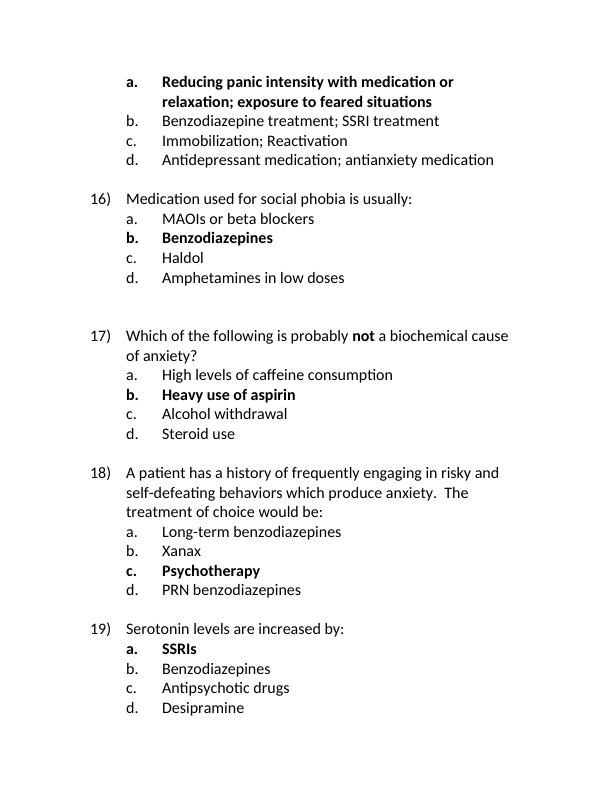
20) Medical causes of anxiety symptoms include:
a. Hyperthyroidism
b. Adrenal tumor
c. Hypoglycemia
d. Any of the above
21) A schizophrenic patient taking antipsychotic medication is
extremely restless, unable to sit still. This probably is:
a. An attention deficit disorder
b. A medication side effect
c. A reaction to delusional thoughts
d. A primary symptom of psychosis
22) A patient has been on antipsychotic medication for the past
ten years. He shows odd lip, tongue, and extremity
movement. This is probably:
a. Tardive dyskinesia
b. A response to hallucinations
c. A compulsive ritual
d. Seizure activity
23) A patient on antipsychotic medication presents with her
head twisted to one side. The likely treatment would be:
a. Hypnosis and relaxation
b. An IM anticholinergic agent
c. Antispasmodic drugs
d. Discontinuing all medication
24) If a sedating effect is desired when treating a psychotic
patient with antipsychotic drugs, one would most likely use:
a. A high potency antipsychotic
b. A low potency antipsychotic
a. Hyperthyroidism
b. Adrenal tumor
c. Hypoglycemia
d. Any of the above
21) A schizophrenic patient taking antipsychotic medication is
extremely restless, unable to sit still. This probably is:
a. An attention deficit disorder
b. A medication side effect
c. A reaction to delusional thoughts
d. A primary symptom of psychosis
22) A patient has been on antipsychotic medication for the past
ten years. He shows odd lip, tongue, and extremity
movement. This is probably:
a. Tardive dyskinesia
b. A response to hallucinations
c. A compulsive ritual
d. Seizure activity
23) A patient on antipsychotic medication presents with her
head twisted to one side. The likely treatment would be:
a. Hypnosis and relaxation
b. An IM anticholinergic agent
c. Antispasmodic drugs
d. Discontinuing all medication
24) If a sedating effect is desired when treating a psychotic
patient with antipsychotic drugs, one would most likely use:
a. A high potency antipsychotic
b. A low potency antipsychotic
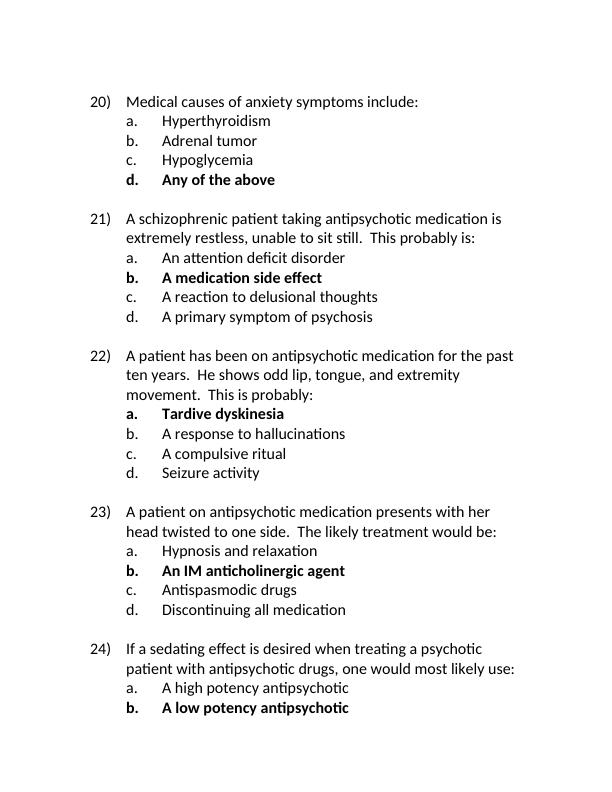
End of preview
Want to access all the pages? Upload your documents or become a member.
Related Documents
Treatment of Depression and Anxiety with Antidepressantslg...
|5
|1232
|66
Pharmacotherapy: Drugs and Their Useslg...
|5
|682
|105
Mood and Anxiety Disorderlg...
|5
|1003
|14
Panic Disorder: Symptoms, Prevalence, Treatment and Current Researchlg...
|11
|1080
|406
Pharmacology Assignment 2022lg...
|12
|2228
|27
Nursing Assignment on Panic Disorder and Mindfulness Therapylg...
|5
|917
|348
